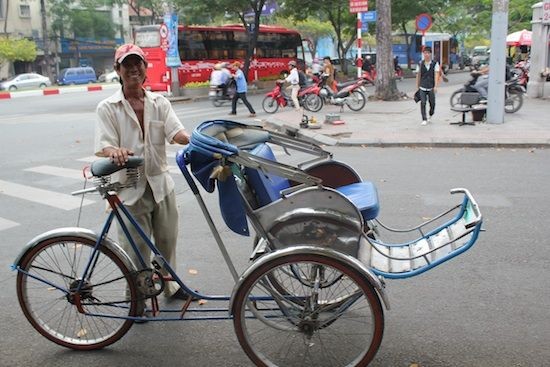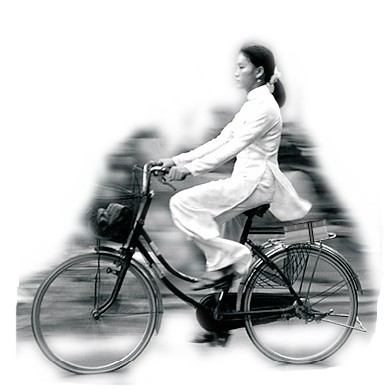
The army had numerous bus stops all over Saigon and Tan Son Nhut with a majority of them in popular destinations and in the more densely populated areas where military personnel lived. Military bus service was dependable, but bus stops created an ideal target for random bombings where Americans congregated waiting for their bus.
Unless one opted to pay for a Vietnamese taxi or cyclo to go to his destination, it was safer and more prudent to just wait the ten or fifteen minutes for the next bus to come along. The cyclos were open front with the rider located in front of the bicycle-powered peddler. One sat at the same level as the exhaust coming from the many other cars and motorcycles on the overly-crowded streets. It was especially brutal at the traffic lights where dozens of scooters and motorcycles poured out their fumes from poorly-tuned motors and clogged the intersections.

Cyclo driver waiting for customer
The taxis were less extreme than the cyclos as long as you could effectively communicate your destination to the driver who spoke little English and understood even less. I learned from some of the old-timers not to mention streets or address to these drivers. “Just give them a well-known landmark close to where you’re going, and they’ll get you there,” SSG Takada once told me. He also instructed me to show them the money upfront that I was willing to pay for the trip. “If he doesn’t accept it, walk away. There are dozens of others nearby wanting to take your money.” SSG Takada knew his stuff.
While the busses were somewhat of a safer mode of transportation, they were not entirely safe. It seems the army busses were driven by lower-ranked personnel who didn't seem to like their jobs much. Many of these folks were bored to be driving probably an eight-hour shift. Boredom drove many of them to smoking pot, and I recall a few times I would board a bus and got a whiff of the driver's recently-smoked pot. Once when I was the last passenger getting off the bus at Tent City B, I asked the driver, " Hey, where do you get your smokes?" The driver was a Specialist Four whom I come to know riding his bus to and from Saigon PX.
"I buy my smokes at the PX just like you do," replied the driver.
"No, I mean the good stuff," I said. "I smelled it getting on the bus."
"I can put you in touch with my Vietnamese friend," he said.
A few weeks later I ran into him at our mess hall. He was a Private First Class. "Man! What happened to you," I asked.
"Well, I'm not supposed to pick up any Vietnamese, but last week I picked up a gal who was walking in the rain carrying a basket of veggies. I was done for the day and was going to take my bus to the motor pool and spend time with the gal. Coming through the front gate, I told her to hide between the seats. The dumbass MP at the gate decided to board my bus and inspect for contraband. I didn't know the girl was carrying pot in the basket. I got busted to PFC and fined a shitload of money.
"So what do they have you doing now?" I asked.
"Driving," he said. "I'm still driving those goddamn busses."
So my friend kept driving the Tent City B-to-Saigon route while high on dope and all without a single incident.
A greater danger was at their bus stops. Early on, I became aware of the inherent risk that these bus stops held and would never sit on the bus stop benches but stood several meters away from them. My survival instinct proved valid when a bus stop in downtown Saigon was bombed injuring several Americans. Captain Conley who was our admin officer with US Army Vietnam Signal Directorate was patiently waiting for a bus returning from the Brinks PX. He called the office to tell us he would not be back to work that day. I happened to answer the phone. “I’ll relay the information to Colonel O'Malley. When will you be back?”
“Ojeda, just tell him I sustained some lacerations in a bomb explosion at the PX bus stop. I’m at the hospital and I’m going back to my room when they’re done here.”
That further reinforced my caution meter about bus stops. Safety and caution prevail over comfort and shelter from sun and rain.
I was safely a distance away from the bus stop in front of the Cholon PX. There was a Vietnamese girl about fifteen wearing the traditional Ao Dai dress and a cone-shaped hat riding her bicycle going in front of several soldiers waiting for the bus. She carried a bundle of some five or six books strapped to a bar above the rear tire. She would pump the pedals four or five times, and her bicycle chain would come off. She would dismount delicately, squat to retread the chain, clean her hands gracefully, then mount her bike once more for another four or five pumps on the pedals. This happened for several revolutions, and I initially admired her tenacity, but caution caused me to move a sufficient distance further away from her. It all seemed too intentional and suspicious almost as if choreographed.

Typical Vietnamese schoolgirl riding bike
There were some twenty of us soldiers around the military bus stop. Parked alongside the road were some eight APC's1 being loaded down with beer and rations from the Cholon PX. An Army staff sergeant standing with us felt sorry for the schoolgirl and went and borrowed a couple of crescent wrenches from one of the APC’s. While the girl was once more retreading her bicycle chain yet again, he intervened and retreaded the bicycle chain, loosened the nuts on the back tire then pushed it outward sufficiently to tighten the chain. He then tightened the nuts and said "Fini," to the schoolgirl. Without even acknowledging his help or wiping her hands clean, she quickly mounted her bicycle and hurriedly sped away from us.

Armor Personnel Carrier (APC)
I kept thinking of the potential for a bomb. She could have been assigned to scout the area to see how likely it would be to play upon an unsuspecting American's sympathy to assist in the detonation of a bomb amongst soldiers waiting for their military bus. Fortunately, no incident came of this, but this became for me another lesson learned. To lessen the potential for certain tragedy, let the mind and not sympathy or emotion be your guide. Bus stops are necessary, but safety and caution trump comfort and shelter from the brutal sun and torrential rain.
1 APC - Armored Personnel Carriers.
©Copyright texan@atudemi.com - January 2022